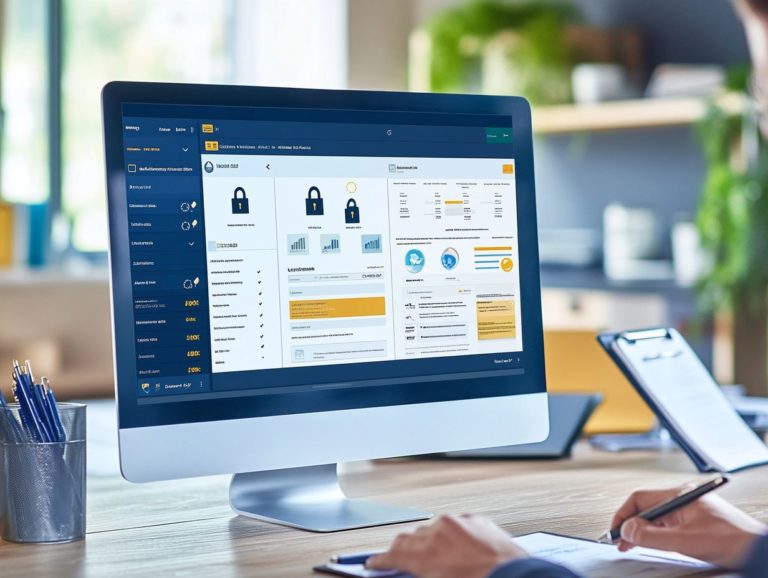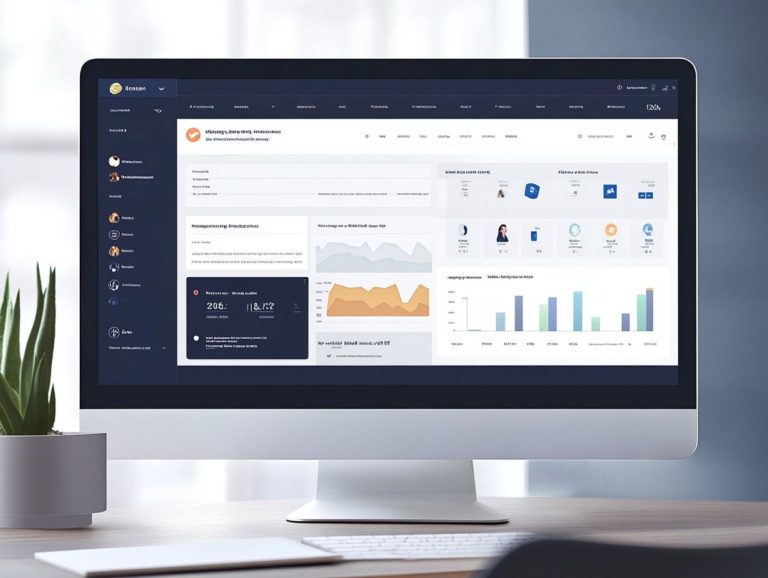What is the Role of a CRM Consultant?
In today s competitive business landscape, effective customer relationship management (CRM) is paramount for success. A CRM consultant plays a vital role in guiding you to harness the full potential of CRM systems, ensuring they align seamlessly with your unique needs and objectives.
This article explores the multifaceted role of CRM consultants, detailing their responsibilities, essential skills, and the myriad benefits they bring to your business. Whether you’re contemplating hiring a consultant or simply seeking to deepen your understanding of their impact, this guide offers valuable insights to help you navigate the intricate world of CRM.
Contents
Key Takeaways:

A CRM consultant helps businesses optimize their CRM strategies to improve efficiency and growth.
They analyze data, design solutions, and provide support to ensure successful CRM implementation.
Hiring one can improve customer satisfaction, increase revenue, and streamline operations for businesses.
Understanding the Role of a CRM Consultant
The role of a CRM consultant is crucial in transforming CRM by using advanced software solutions to refine business processes, elevate data management, and enhance customer engagement.
By tailoring CRM strategies to your specific business needs, a consultant ensures smooth system implementation that paves the way for CRM success. This entails integration of CRM platforms and a comprehensive grasp of project management methodologies to achieve desired outcomes.
Through effective communication and collaboration with stakeholders, CRM consultants craft bespoke solutions that enhance performance monitoring and data accuracy.
What Does a CRM Consultant Do?
As a CRM consultant, you take on a variety of critical tasks that are vital for the effective deployment and management of CRM systems.
Your role ensures that these systems align perfectly with the unique needs of both the business and its clients.
Key Tasks and Deliverables
Key tasks for you as a CRM consultant encompass analyzing business processes, implementing data management systems, and designing automated workflows that boost user adoption.
You also lead training sessions for staff, helping everyone grasp the system’s functionalities and fostering an environment where the technology can be fully leveraged.
Performance monitoring becomes a significant focus as it aids in identifying potential issues early, enabling timely interventions. This meticulous attention to detail not only supports troubleshooting but also enhances overall user satisfaction, ensuring that best practices in CRM are consistently upheld.
Skills and Qualifications of a CRM Consultant

The skills and qualifications of a CRM consultant are essential in determining their effectiveness in implementing CRM systems and ensuring these systems align seamlessly with your business objectives.
Ready to enhance your customer relationships? Consider hiring a CRM consultant today!
Essential Skills and Experience
Essential skills for you as a CRM consultant encompass strong analytical abilities, effective communication, and hands-on experience with various CRM platforms such as Salesforce, Microsoft Dynamics 365, and HubSpot.
These attributes not only enhance your capability to interpret and analyze customer data but also enable you to accurately identify trends and opportunities. A solid understanding of data integrity is paramount, ensuring that the information you utilize is reliable crucial for seamless technology integration.
A customer-centric mindset is vital. It allows you to create solutions that truly meet client needs. Collaboration with stakeholders is equally important; effective partnerships enable you to gather diverse insights, fostering an environment where technology aligns seamlessly with business objectives.
Benefits of Hiring a CRM Consultant
Hiring a CRM consultant unlocks incredible benefits, such as fostering significant business growth, streamlining operational efficiency, and increasing customer loyalty.
These elements are essential for securing a competitive advantage in today s dynamic market landscape.
Impact on Business Growth and Efficiency
The impact of a CRM consultant on your business growth and efficiency can be transformative. These experts design and implement customized CRM strategies that align with your organizational goals.
By looking at how customers interact with your business, they enhance your sales processes. They also nurture stronger relationships with clients, ultimately boosting satisfaction levels.
For instance, effective data management through a well-executed CRM enables you to anticipate customer needs, personalize your communication, and resolve issues swiftly.
With a strong emphasis on data integrity, you ensure that all stakeholders have access to accurate information, fostering seamless collaboration across departments. This proactive approach elevates your efficiency and drives loyalty and revenue growth, highlighting the essential role of strategic CRM initiatives in today s competitive marketplace.
Choosing the Right CRM Consultant
Choosing the right CRM consultant is essential for success. Their expertise can markedly impact the effectiveness of the entire project management process, ensuring that your investment yields the desired results.
Factors to Consider and Questions to Ask

When selecting a CRM consultant, you should consider various factors and ask specific questions that help determine their suitability for your organization s unique business needs.
Evaluating their experience with CRM systems is crucial, as it directly influences their ability to craft solutions that align with your objectives. Their familiarity with integration tools can also streamline processes and enhance overall functionality. A strong understanding of customer-centric strategies ensures that the consultant can prioritize your clients’ needs, leading to improved engagement and retention.
To uncover their true capabilities, think about asking questions like:
- “Can you describe a project where you successfully customized a CRM solution to meet specific client requirements?”
- “What strategies do you implement to ensure seamless integration with existing systems?”
These inquiries will provide insight into their expertise and how they tackle unique challenges.
Working with a CRM Consultant
Engaging with a CRM consultant necessitates a commitment to effective collaboration and communication. This ensures your CRM system perfectly meets your goals.
It’s all about creating a winning partnership that propels your success to new heights.
Effective Communication and Collaboration
Effective communication and collaboration between you and your CRM consultant are essential for achieving successful outcomes in project management. This ensures that all stakeholders remain engaged.
Utilizing tools such as Slack, Microsoft Teams, and Zoom can significantly enhance your interactions. These platforms provide seamless avenues for real-time discussions, file sharing, and video conferencing. They empower your team to stay connected, quickly respond to feedback, and maintain clear communication channels for updates.
Establish a routine for regular updates and progress meetings. This ensures alignment and demonstrates your commitment to detail. Keeping stakeholders informed about project developments fosters a culture of transparency and accountability, making it easier to get things done quickly and efficiently.
Frequently Asked Questions
What does a CRM Consultant do?
A CRM consultant assesses a company’s needs for managing customer interactions and provides guidance on implementing and optimizing CRM systems. Their goal is to improve the overall customer experience and drive business growth.
What skills does a CRM Consultant need to have?

A CRM consultant should possess strong analytical and problem-solving skills alongside excellent communication and project management abilities. They should have a deep understanding of CRM systems, technologies, industry trends, and best practices.
What are the main responsibilities of a CRM Consultant?
- Analyze current CRM processes.
- Identify areas for improvement.
- Recommend and implement CRM solutions.
- Train and support employees on system usage.
- Regularly monitor and optimize the system for maximum effectiveness.
What are the benefits of hiring a CRM Consultant?
Ready for a fresh perspective? A CRM consultant can enhance your CRM strategy, leading to improved customer relationships, increased sales and revenue, and better customer loyalty and retention. They also streamline and automate processes, saving time and resources for your company.
How does a CRM Consultant work with a company?
First, a CRM consultant meets with company representatives to understand their business goals and current CRM processes. They conduct a thorough assessment and recommend implementing and optimizing a CRM system. The consultant then customizes and implements the system, trains employees, and provides ongoing support and optimization.
What types of companies can benefit from hiring a CRM Consultant?
Any company that wants to improve its customer relationships and drive business growth can benefit from hiring a CRM consultant. This includes small businesses, large corporations, and organizations across various industries such as retail, healthcare, finance, and more.
Contact us today to see how a CRM consultant can elevate your business!






